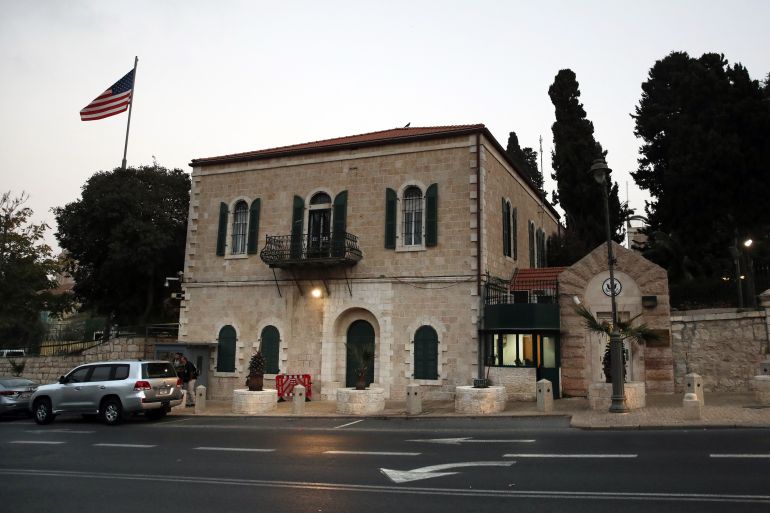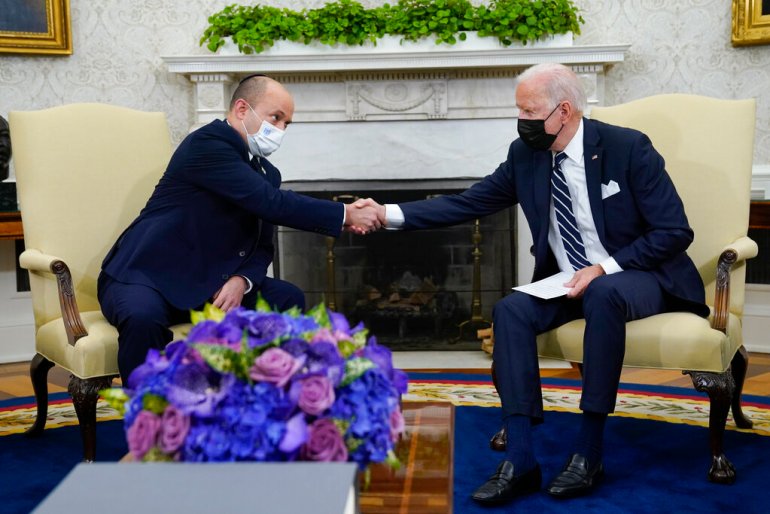Why Biden’s Jerusalem consulate promise remains unfulfilled
A year into his presidency, Joe Biden has failed to meet his pledge to reopen a consulate for Palestinians in Jerusalem.

Washington, DC – The United States’s diplomatic presence in Jerusalem predates the establishment of the State of Israel by nearly a century, and an American consulate in the holy city provided services to Palestinians in East Jerusalem, the West Bank and Gaza since 1967.
That is, until former President Donald Trump closed it in 2019.
Keep reading
list of 3 itemsElderly Palestinian man dies during arrest by Israeli army
Israeli forces violently suppress Palestinian protest in Naqab
A year earlier, the Trump administration announced plans to shut down the US Consulate General in Jerusalem, saying it would make consular services available through the US embassy, which had been contentiously relocated from Tel Aviv to holy city that same year.
The move prompted denunciations from Palestinians, and Joe Biden pledged to reopen a consulate specifically designated for Palestinian affairs in Jerusalem. But a year into his first term in office, the US president has so far failed to deliver.
Here, Al Jazeera looks at where things stand – and what factors are playing a role in the consulate’s status:
What did Biden promise?
During the US presidential campaign, Biden unambiguously and repeatedly pledged to reopen the consulate, especially in outreach efforts to Arab and Muslim voters.
“As President, Biden will take immediate steps to restore economic and humanitarian assistance to the Palestinian people, consistent with US law, including assistance to refugees, work to address the ongoing humanitarian crisis in Gaza, reopen the US consulate in East Jerusalem, and work to reopen the PLO mission in Washington,” the Biden campaign’s platform for Arab-American communities reads.
The president’s top aides reiterated that promise as recently as October 2021, but in late December, a senior administration official refused to comment when asked whether the consulate would be reopened.
The White House and Department of State did not respond to Al Jazeera’s questions on why the consulate has not reopened yet, or whether the administration is still committed to doing so.

So why do things appear to be stalled?
That remains unclear. But Israel – the world’s top recipient of US military aid – has vehemently opposed the American proposal to reopen the consulate, in what analysts have said is a show of defiance against the Democratic president’s plan.
Amid criticism from Benjamin Netanyahu’s Likud Party, Israeli Prime Minister Naftali Bennett told the Knesset that his government is aiming to “remove the issue from the table”.
“The government under my leadership has repeatedly clarified its position that there is no place for a Palestinian consulate in Jerusalem,” Bennett said last month. “Jerusalem is the capital of one state, the State of Israel. Period.”
Israel captured the eastern part of Jerusalem in 1967 and annexed it in 1980 in violation of international law. The Palestinian Authority (PA) seeks East Jerusalem as the capital of a future Palestinian state, but Israeli leaders insist that the city must remain the undivided capital of Israel – a position shared by prominent US politicians from both major parties.
Khalil Jahshan, executive director of the Arab Center Washington DC, said Bennet’s fragile government “succumbed to pressure internally” to harden its opposition to the consulate.
“What is happening is the issue has become a problem in the bilateral US-Israeli relationship,” Jahshan told Al Jazeera. “The Israeli opposition to reopening the consulate, instead of diminishing over time – as the administration thought – has doubled and tripled and quadrupled.”
Why is the consulate such a contentious issue?
While the consulate was never labelled as one for Palestine, its presence demonstrated a level of American diplomatic acknowledgement of Palestinians, and its location offered some level of implicit US recognition of Palestinian claims to East Jerusalem.
The Trump administration’s decision to shutter the consulate came as part of a series of policy moves denounced by Palestinians, including moving the US embassy from Tel Aviv to Jerusalem and closing the Palestine Liberation Organization’s office in Washington, DC.
Although the former administration insisted these measures did not change the US’s position towards Jerusalem and aimed to increase “efficiency”, Trump tweeted after the embassy move: “We have taken Jerusalem, the toughest part of the negotiation, off the table.”
Michael Oren, a former Israeli envoy to the US, also hailed the decision to shut down the consulate, saying in 2018 that it “ends the last vestige of American support for the city’s division”.
A great day for Israel, Jerusalem, and the United States. SoS Pompeo’s announcement closing the U.S. consulate in Jerusalem and transferring its responsibilities to the embassy ends the last vestige of American support for the city’s division. Israel is deeply grateful.
— Michael Oren (@DrMichaelOren) October 18, 2018
What would reopening the consulate signal?
While Biden decided to keep the US embassy in Jerusalem, his plan to reopen the consulate was seen as a conciliatory measure signalling that Washington still views the holy city as disputed.
Jahshan said reopening the consulate would be a largely symbolic gesture, but one that key parties have attached significant value to.
In 2018, the Palestinian Authority called closing the US consulate an attack on Palestinian sovereignty that has “nothing to do with ‘efficiency’ and a lot to do with pleasing an ideological US team that is willing to disband the foundations of the international system and of US foreign policy, in order to reward Israeli violations and crimes”.
“The Palestinian side wanted [the consulate] because it’s a symbolic thing. It challenges Israel’s declared-victory under Trump – that that’s it, Jerusalem is theirs, and there is nothing in Jerusalem that includes the Palestinians,” Jahshan told Al Jazeera.
Is Israel’s permission required to open the consulate?
That is not entirely clear.
US Department of State official Brian McKeon suggested that the US needs Israel’s permission to reopen the consulate. “That’s my understanding – that we need the consent of the host government to open any diplomatic facility,” McKeon told a congressional hearing in October.
But Palestinian Prime Minister Mohammed Shtayyeh has stressed that the US does “not need the permission of anybody” to re-establish the diplomatic mission. In November, he also warned against opening the consulate in the occupied West Bank. “Ramallah is not Jerusalem, and Ramallah is not the capital of Palestine,” he said.
Jahshan said the matter is political, not legal or logistic. “The issue is not can or can’t; the issue is will or will not,” he said. “And clearly this administration is not going to challenge Israel on this issue.”
Is Biden facing domestic pressure over the issue?
After a group of US lawmakers met Bennett in September, Democratic Senator Chris Murphy said the American legislators stressed the importance of reopening the consulate.
His colleague Chris Van Hollen underscored that the US president has committed to re-establishing the diplomatic post, saying that it’s “important that he keep his word, follow through, and reverse Trump’s harmful decision”.
Yes, we had good meetings and raised this issue. It was also a commitment @POTUS made and important that he keep his word, follow through, and reverse Trump’s harmful decision. https://t.co/gGYTnvG7h0
— Senator Chris Van Hollen (@ChrisVanHollen) September 3, 2021
But just as some Democrats are backing the consulate pledge, Republicans are rallying against it.
In October, Republican senators Bill Hagerty and Marco Rubio introduced a bill that would prevent the opening of a diplomatic post for Palestinians in Jerusalem. “It is outrageous that the Biden Administration continues to voice support for reopening a consulate in Jerusalem, which calls into question its status as Israel’s capital,” Rubio said in a statement at that time.
The bill, co-sponsored by 39 Republicans, has little chance of passing in the Democratic-controlled Congress, but it highlights the political risks that would accompany the move, as well as pro-Israel hawks’ willingness to challenge it. A House version of the bill introduced in October has 122 Republican co-sponsors.
Some conservative Democrats, including House member Josh Gottheimer, have also cautioned Biden against reopening the consulate.
“The administration feels the pressure from the pro-Israel side, and it’s not willing to engage in a serious clash that will jeopardise the relationship with [Israel] over something that the administration deep down knows is only symbolic,” Jahshan said.
What are Palestinian rights advocates in the US saying?
Several Palestinian rights advocates have voiced dismay at Biden’s failure to fulfil his election promise to reopen the consulate.
Activists told Al Jazeera that the US president ran as a pro-Israel candidate, but courted Arab and Muslim voters with minor policy shifts on Israel-Palestine. They said that so far, Biden has largely continued Trump’s anti-Palestinian policies:
- Amer Zahr, Palestinian-American comedian and activist: “Biden promised primarily to open up the consulate in East Jerusalem. He has now basically left that to the whim of the Israelis; the Israelis don’t want it to happen, and so it’s not happening. He has broken every promise that he made to the Palestinian American community … It is a major slap in the face to people who came out and supported him against Trump.”
- Ahmad Abuznaid, executive director of the US Campaign for Palestinian Rights (USCPR): “Not only are the Palestinian people not a priority for the Biden administration, but in fact, the administration continues to be in direct opposition to the development of the human rights and dignity for the Palestinian people.”
- Hatem Abudayyeh, co-founder of the US Palestinian Community Network (USPCN): “Biden won’t even reopen the consulate in East Jerusalem. Tell me again what makes Biden any different on Palestine than Trump, Bush, Obama or anyone else?”